This recording offers a selection of five performances by Sri Chinmoy, singing the song “Ami Jabo”. Ami Jabo was a song which Sri Chinmoy frequently performed during his Peace Concerts.
Sri Chinmoy Sings Ami Jabo – 5 Selected Performances
Last modified December 11, 2020
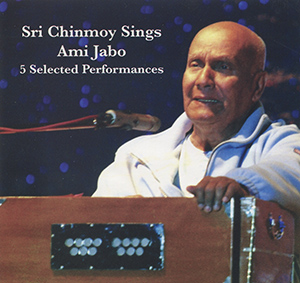
It was performed in almost every concert he offered, at least in the later years of his life on earth. So it occupied a special place in his heart.
The melody to this song is not composed by Sri Chinmoy – the music is from the Bengali devotional song “Phire Chalo” which Sri Chinmoy also often sang in concert. But the words, the lyrics, to Ami Jabo, are by Sri Chinmoy, and were written on December 31st, 1969:
Ami jabo ami jabo ami jabo hridaya pure
Agni sadhak bahni premik phutechi aj agun sure
Lobher bandhan moher shasan
Doinya jatan bhagna swapan
Abasheshe ek nimeshe ajanate bahu dure
Simar kole asim dule
Kanur benu jiban mule
Mahashiber pralay nachan nutan srijan jore ghure
Translation (by Sri Chinmoy):
I shall enter into my heart’s citadel-city.
I am a worshipper of the Fire God;
I am a lover of the Fire God.
I have blossomed today
Into the melody of fiery flames.
The bondage of possession-greed,
The iron control of dark attachment,
The torture of penury,
The pangs of my shattered dreams
Have at last disappeared in a twinkling
into the farthest, remote unknown.
On my finite lap the Infinite is swinging.
The ever-intoxicating and ever-energising
Flute of Sri Krishna
Is the very origin of my life’s journey.
The Destruction-Dance of the great Lord Shiva
Ushers in a new creation
Encircling fast my earth-bound life.Sri Chinmoy, One thousand lotus petals, part 2, 2000
Sri Chinmoy borrowed this tune from the Bengali devotional song “Phire Chalo”. The lyrics of this song were written by Sourindra Mohan Mukhopadhyay and the melody was composed by Raichand Baral. The song was featured in the 1933 film “Chandidas” and made immortal by the blind singer Krishna Chandra Dey. The translation of the lyrics run as follows:
Phire Chalo, apana Ghare …
Let us return Home, let us go back,
Useless is this reckoning of seeking and getting,
Delight permeates all of today.
From the blue ocean of death
Life is flowing like nectar.
In life there is death; in death there is life.
So where is fear, where is fear?
The birds in the sky are singing “No death, no death!”
Day and night the tide of Immortality
Is descending here on earth.Sri Chinmoy, Eternity’s Breath, Agni Press, 1972
By singing this song, a great singer of India, K. C. Dey, became immortal overnight. God had denied him sight; he was stone blind. But God sang through him in such soul-stirring grandeur as he performed this song for the famous film “Chandidasa” that his name became immortal in India.
In this song, Home is beckoning us. According to the Vedas, Home is Heaven on Earth, for it is by abiding in the soul here on earth that we achieve spiritual Bliss. In the Rig Veda, the seers sing: “Madhumat Punarayanam” which means “Sweet be my return [home].”
Notes on the lyrics:
by Kamalakanta Nieves
I remember Sri Chinmoy telling us that in India, it is seen as a compliment if you use someone’s melody; it is a form of praise.
Regarding the lyrics by Sri Chinmoy, they are really momentous! It is a song of great universality, a common thread in Sri Chinmoy’s devotional songs:
“I shall enter into my heart’s citadel-city.”
This is a journey that every truth-seeker and God-lover must undertake for his/her full realisation. The foundation of Sri Chinmoy’s spirituality can be found in the pure, essential message of the Upanishads, in the best Vedic tradition. In the Upanishads, it is said that the spiritual heart is as small as one’s thumb but vaster than the universe. And it is one of the most beautiful realisations of the ancient Vedic seers, that inside the finite, the Infinite abides. Inside every atom of creation, the Creator Himself is hiding, waiting to be discovered, like a child, playing hide and seek!
Question: When you speak of the heart as being the centre of love and the place where the soul resides, do you mean the physical heart, or is ‘heart’ just a term that you use?
Sri Chinmoy: “I am not speaking of the human heart, the physical heart, which is just another organ, or the emotional heart, which is really the vital. I am speaking of the pure heart, the spiritual heart. Some spiritual Masters say that the spiritual heart is in the centre of the chest; some say that it is located a little to the right; some say to the left. There is even one spiritual teacher who says that the heart is a little above the centre of the eyebrows at the place we call the third eye. How can a spiritual Master say this? Because the illumined third eye is light, and the illumined heart is also all light. But according to my own realisation, the spiritual heart is located in the centre of the chest, in the centre of our existence.”
“The heart is like the commander-in-chief, while the soul is the king. When the soul comes into existence, its first concern is to illumine the heart. When the soul withdraws from the body, automatically the commander-in-chief loses all his power. The heart wants to stay with its king. It does not want to go and join another king or another army. In the outer world our friends may deceive us; but in the case of the soul and the heart, their intimacy is thicker than the thickest. The physical sometimes does not listen to the soul. The mind and the vital may ignore it. But the heart is always faithful to the soul. The heart also knows how to identify itself with others’ hearts. The mother does not have to show her love for her child by saying, “I love you, I love you,” because the mother’s identification with the child makes the child feel that he is loved. The real heart does not need to convince; it has the power of oneness.”
Sri Chinmoy, Mind-Confusion And Heart-Illumination Part 2, Agni Press, 1974
“I am a worshipper of the Fire God; I am a lover of the Fire God.”
It is said also in the Upanishads, about the origin of meditation, that in the ancient past, the seers looked around, and saw a spark of light in the eyes of human beings; they looked around and saw the same spark of light in the eyes of animals, and they saw this spark of light in the sun, the moon and the stars, and they thought, “maybe this spark of light is also within me?”, and they learned to silence their breath, and their mind, and their senses, so they could go within, and try to discover if this spark of light, this fire they saw everywhere, was within themselves. And they discovered that yes, this fire that was inside the sun, was also inside their heart. And they called it Agni, the fire-god.
“I have blossomed today
Into the melody of fiery flames.”
Here the seeker has found, and become one with this inner fire, this inner cry that Sri Chinmoy calls “Aspiration”. It is a yearning, a cry for something higher. When this inner cry, this inner fire, is awakened in the seeker, the inner journey starts, and transformation not only becomes possible, but inevitable, for it is the awakening of the Infinite inside the finite. It is the most powerful thing on earth; the Universal Will in the individual life.
“What is aspiration?
It is our heart’s quest
For the perfect manifestation
Of God’s Fulness on earth.”
Sri Chinmoy, Twenty-Seven Thousand Aspiration-Plants, Part 172, Agni Press, 1992
“The bondage of possesion-greed,
The iron control of dark attachment,
The torture of penury,
The pangs of my shattered dreams
Have at last disappeared in a twinkling
Into the farthest, remote unknown.”
In the blazing fire of aspiration is our liberation from bondage, attachment and suffering:
MY ROOMS
Lord, my heart-room is full of You
And Your Light,
My mind-room is full of me
And my ignorance-night,
My vital-room is expecting
A reliable tenant,
My body-room is not
Worth living in.
Sri Chinmoy, Europe-Blossoms, Agni Press, 1974
“The ever-intoxicating and ever-energising
Flute of Sri Krishna
Is the very origin of my life’s journey.”
Sri Krishna manifested Divine Love. This love of light is the driving force in our journey. Meditation, the inward journey, is based on love, love for Truth and Light.
“The Destruction-Dance of the great Lord Shiva
Ushers in a new creation
Encircling fast my earth-bound life.”
Lord Shiva represents the transformation aspect of God. He fights against the forces of evil and obstruction. He fights against darkness. When God’s Blessings come in the form of transformation, our speed towards the Goal increases, “ushering” in a new life.
Story by Sri Chinmoy: The origin of Vishnu’s Sudarshana Chakra
This is the story of how Vishnu’s Sudarshana Chakra came into existence. The asuras, or demons, were extremely bad. They always tortured the cosmic gods. At one time, the cosmic gods were suffering so much from the attacks of the demons that they went to see Lord Vishnu. They wanted to seek his help in defeating the demons.
Vishnu said to them, “I do not have enough power to defeat or destroy the demons. I must seek help from Shiva. I will ask him to give me a special weapon that will help me defeat the demons.”
When Vishnu went to Shiva, he found Lord Shiva in trance. Vishnu did not want to disturb Shiva’s meditation, so he started praying and praying to Shiva with the hope that one day he would come out of his trance.
Every day, for years and years, Vishnu prayed to Shiva, meditated on Shiva and chanted Shiva’s name very devotedly. He offered one thousand lotus blossoms to Shiva every day. Each time he offered Shiva a lotus blossom, he would chant Shiva’s name.
This went on for such a long time and still Shiva remained rapt in trance. Poor Vishnu was helpless! The gods were being mercilessly tortured by the demons and he was unable to save them.
Finally, after many long years, Shiva came out of his trance. Vishnu’s joy knew no bounds. He ran to gather one thousand lotus blossoms so that he could worship Lord Shiva and ask for a special boon.
Shiva had already decided that he would grant Vishnu the boon, but first he wanted to play a trick on Vishnu. He secretly went to the spot where Vishnu had placed the lotus flowers and stole one flower. Now there were only 999 flowers.
After making all his preparations, Vishnu began to worship Shiva most devotedly. One by one, he offered the lotus flowers and chanted Shiva’s name. When he came to the end, he realised that one flower was missing. He had only counted 999. That meant he had to go and find one more lotus. Instead of doing that, he immediately plucked out one of his eyes and placed it before Shiva.
When Shiva saw that Vishnu had such devotion for him, he said, “I will grant you anything that you ask for.”
“Please give me something that will help me to conquer the asuras,” said Vishnu.
Shiva replied, “I give you this round disc. It will help you to conquer all your enemies. No matter how many demons come to attack you and the other gods, you will be able to defeat them all with this disc.”
The name of the disc was the Sudarshana Chakra. When Lord Krishna took incarnation, Vishnu gave him this chakra, because Krishna was the embodiment of Vishnu. Krishna could immediately use the chakra at any time; it was his own property. Sri Chaitanya also used the Sudarshana Chakra a few times. He was able to invoke it and it would come to him. When he wanted to kill Jagai and Madhai, for example, he invoked it. These two ruffians saw it coming from Heaven and became extremely frightened. Before it reached them, they surrendered to Sri Chaitanya.
The Sudarshana Chakra is not thrown. With will-power it is sent against the enemy. It rotates very, very fast after leaving the finger and chases the enemy. The chakra itself is round and has something like the points of arrows all around its edge. It has tremendous occult and spiritual power to destroy everything. Nobody can stand against the Sudarshana Chakra.
Sri Chinmoy, The Earth-Illumination-Trumpets Of Divinity’s Home, Part 3, Agni Press, 1995
Dear listeners, it is my hope that Sri Chinmoy’s singing of Ami Jabo will inspire you in your inner journey. Thank you for visiting our humble site.
– Kamalakanta
Artist: Sri Chinmoy
Name: Sri Chinmoy Sings Ami Jabo – 5 Selected Performances
Composer: Sri Chinmoy
Release Year: 2007
Duration: 24 minutes
Acknowledgements: Sri Chinmoy
Tracks uploaded and published: Kamalakanta Nieves and Tejvan Pettinger
Format: Advanced Audio Coding

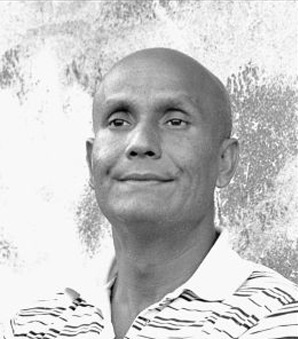

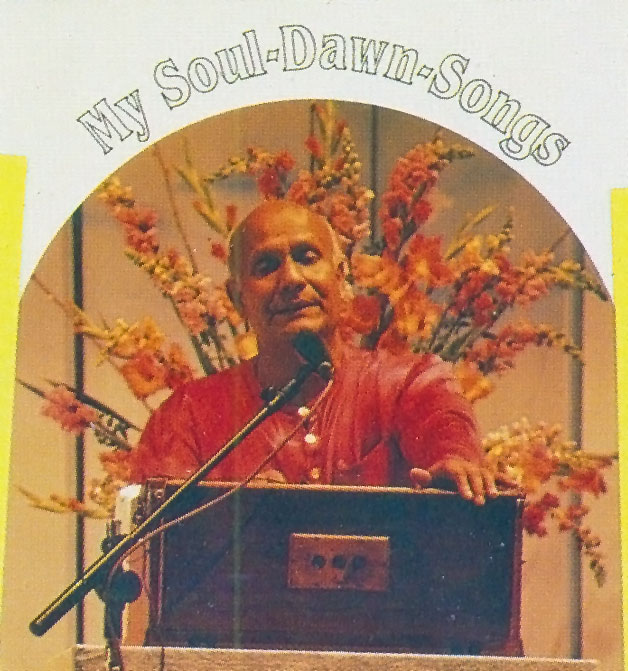
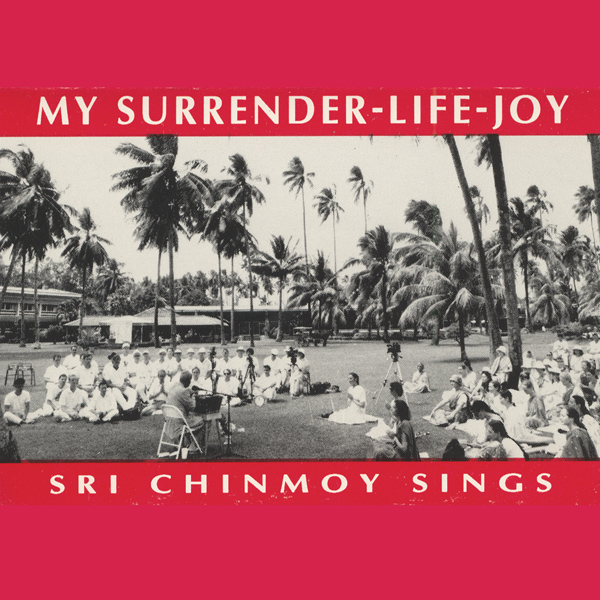
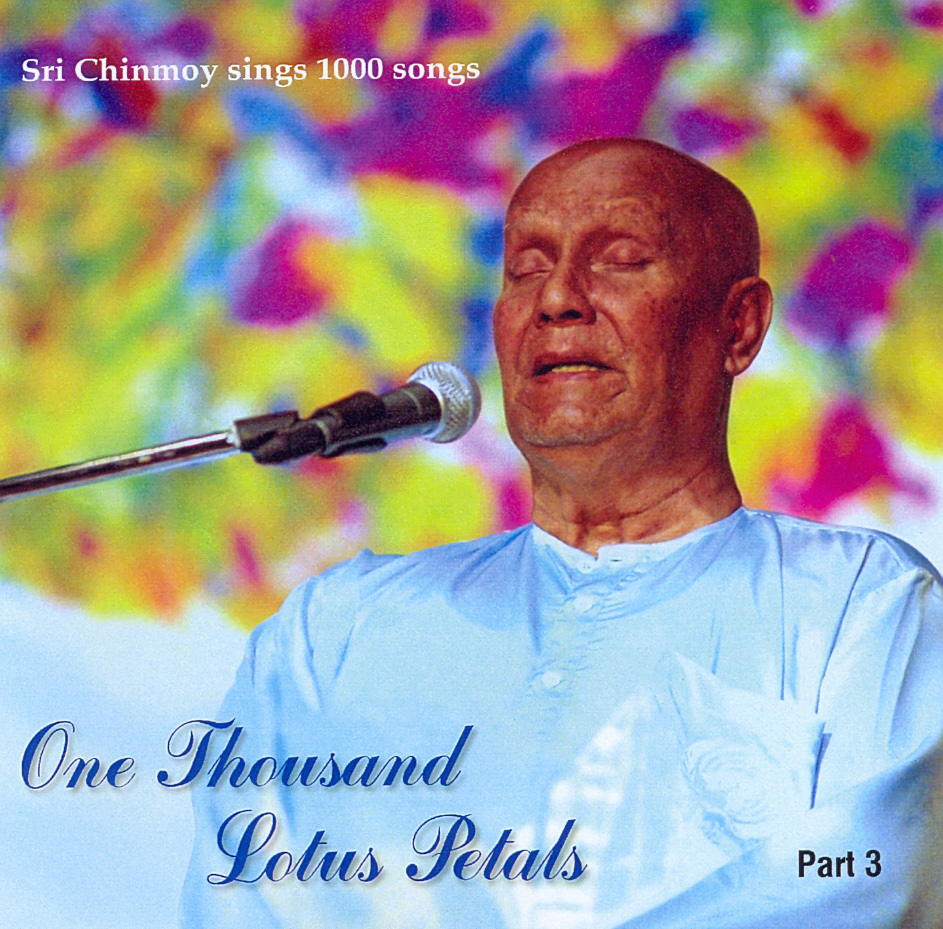


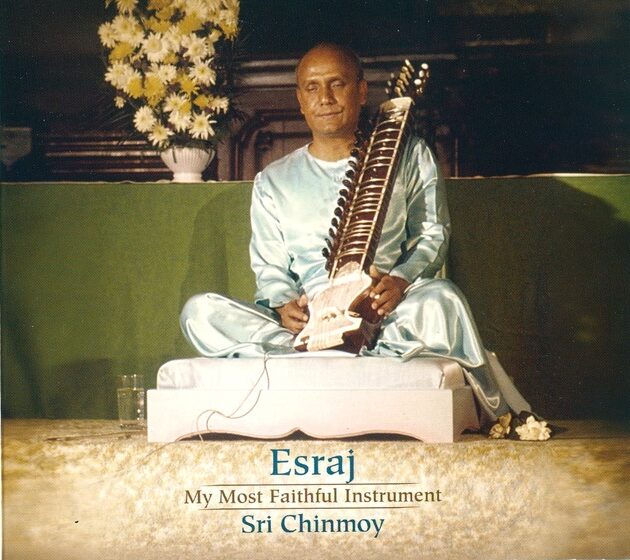
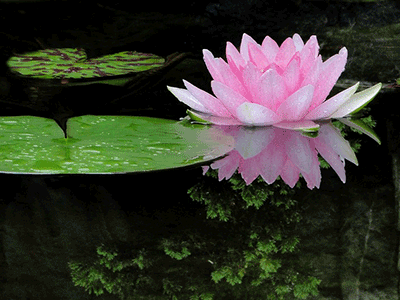
dear heart friends
with special curiosity and reading to your comments on this beautiful song
the value only magnifies listening to the heart shaking voice of Sri Chinmoy. Please let me never forget this song and it’s meaning for all humanity and our planet on which we live and love.
Enjoy the feeling of resonance and greetings to all you.